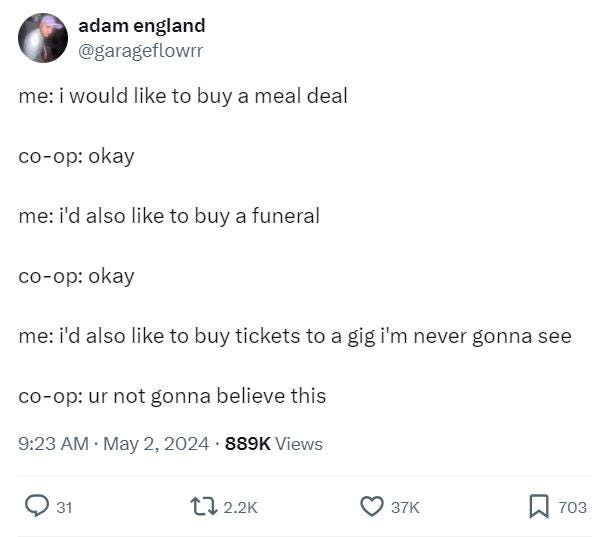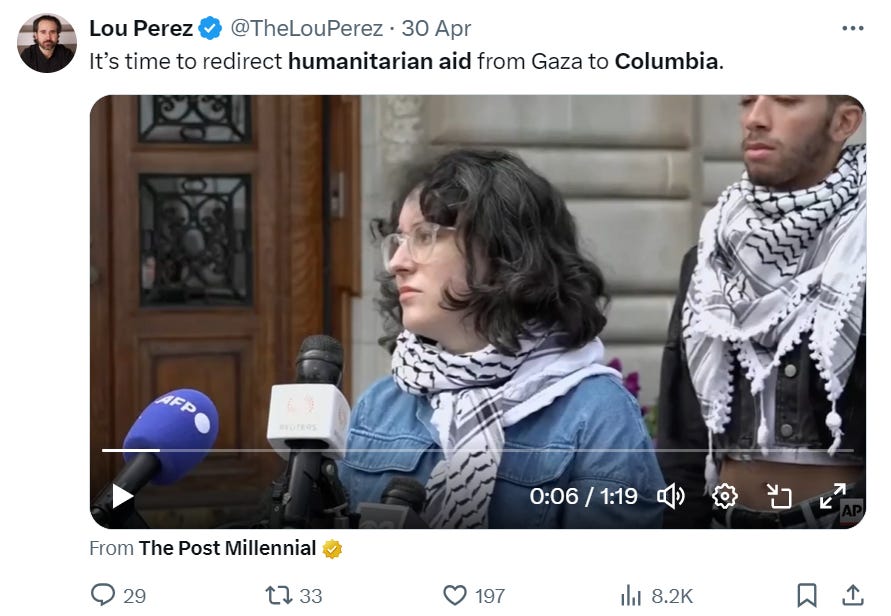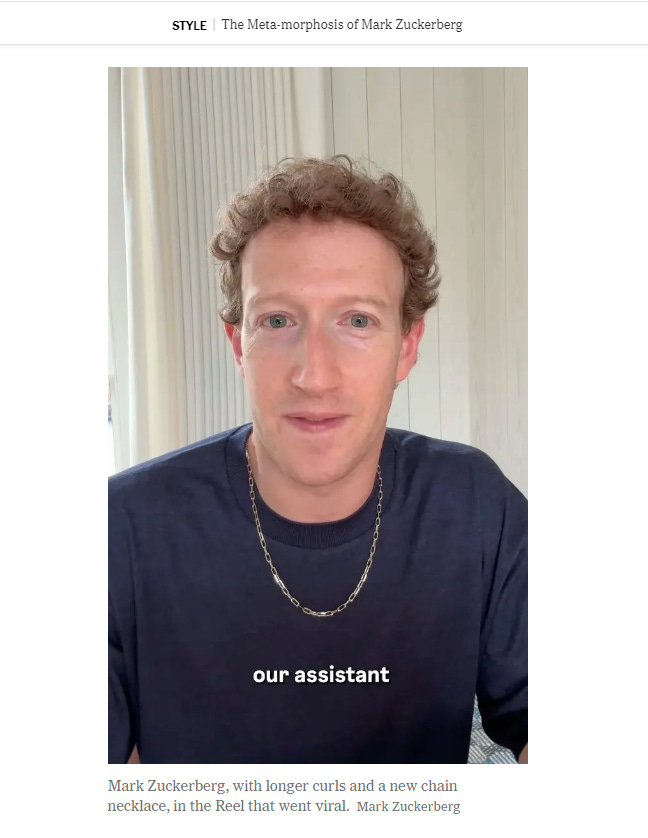Borkowski Media Trends: Co-Op Live's Comms Crisis | UMG vs TikTok: Truce? & MORE
PLUS: Columbia Protests || Zuck's Meta-morphosis
Co-op Live’s Failure to Thrive
A further PR crisis has hit the beleaguered Co-op Live Arena this week after its debut event was cancelled for the third time. On Wednesday, A Boogie Wit Da Hoodie show was cancelled after concert goers had already started to file into the venue. The last minute nature of this announcement was blamed on a “technical issue” which turned out to be an air conditioning unit coming crashing down during soundcheck. The woes of operator Oak View Group only grew when household names Take That and Gen Z darling Olivia Rodrigo were also forced to cancel or relocate gigs. But of course, it isn’t Oak View’s name on the impossible to open tin – it’s high street stalwart Co-op taking the real reputational hit.
Co-op Group attempted to create some distance, with a statement saying, “Co-op is a sponsor and does not own or run the venue, and we have made it clear to Oak View Group, who are responsible for the building, that the impact on ticket-holders must be addressed as a priority.” But the internet meme factory doesn’t read to the bottom of news articles looking for the right of reply, so this crisis response is unlikely to do much in the way of brand preservation. It is easy to understand the lure of naming rights for big business looking to boost awareness amongst consumers - the exposure is almost priceless in value. But the trials and tribulations of Co-op Live are a warning that with massive exposure, also comes massive reputational risk.
UMG vs TikTok... who won?
Universal (UMG) and TikTok’s clash feels all too familiar: two heavyweights theatrically locking horns over a vague set of parameters only to shake hands after three months in what appears to be a prolonged ego battle.
Having previously discussed UMG vs TikTok and its licensing dispute that saw UMG squaring up to TikTok claiming unfair compensation for its artists, with three months of hindsight, it’s hard to look past this being UMG’s tactic of attempting to steady or halt TikTok’s roaring momentum over the music industry. UMG raised concerns about AI and artist safety affecting its artists’ revenue, letting its last license with TikTok expire in February and removing its catalogue from TikTok. However their joint statement indicates that this stalemate has concluded, and both parties are working on repopulating UMG’s songs on the platform, with no apparent solution to the AI conundrum.
To quote the press release, “we will work together to make sure that AI tools are developed responsibly to enable a new era of musical creativity and fan engagement while protecting human creativity”. It’s hardly the AI silver bullet!
It’s tough to sympathise with either party when, ultimately, the artists suffer from a lack of exposure to TikTok (unless you’re Taylor Swift, a Universal artist who already allowed her music to return to TikTok because she owns the copyright to her work). In February, we questioned whether UMG was leveraging the standoff to renegotiate terms with other streaming platforms or a strategic move to curtail TikTok’s burgeoning influence and bolster UMG’s streaming services. And while we can only speculate, this saga struck more like a fiscal dispute between two giants, while the artists were used as pawns to leverage a better deal.
Columbia Protests: Humanitarians or Trustafarians?
The recent wave of student protests at university campuses worldwide, but most notably at Columbia, calling for divestment from Israel, has ignited a multi-layered dialogue on activism and privilege.
A viral incident involving a Columbia University Ph.D. student demanding "humanitarian aid" for occupying protesters highlights the nuanced expectations of modern protesters, who navigate between demanding global justice and appealing for institutional support.
Media coverage of these events has varied significantly, with some narratives emphasising the socioeconomic diversity among protesters, while others critique what they perceive as a backdrop of privilege. For instance, a New York Post article highlighted the affluent backgrounds of many protesters, painting a picture of privilege that sparked debate about the authenticity of the students' activism.
Much of the criticism hinged on the fact that in asking for humanitarian aid, the Columbia students appropriated the suffering of those Palestinians, assuaging their own privilege-based guilt by putting themselves in this situation. (e.g. here)
However, in a debate where no one can be considered objective, these critiques raise questions about whether the focus on protesters' privilege is aimed at genuinely assessing the motives of the protests or strategically discrediting them as hypocritical "wokery."
But there has also been praise: numerous comparisons have been made between this scenario and the 1960’s student protests against the Vietnam war, arguing that these students are only following a long tradition of principled Columbia students. (e.g here)
Like today’s protests, these combined demands for university policy changes with broader political aims, such as ending a war and promoting civil rights.
In contrast, today's student movements often face criticism for a perceived lack of broader engagement with global injustices, as evidenced by the focus on one region despite ongoing conflicts elsewhere. Moreover, modern protesters contend with a different dynamic of media coverage and public perception.
Zuck’s Meta-morphosis: style over substance?
You could almost be forgiven for not knowing the finer details of Meta’s latest product development, an AI driven assistant which was announced recently, as the announcement was rather overshadowed by CEO Mark Zuckerberg himself.
For anyone who missed the announcement video, Zuckerberg appears looking quite unlike his typical self, the short hair is replaced with unruly curls and he sports a silver chain than could almost be called fashionable (and has been by some X users). For a man known for his efficient approach to clothing, having gone so far as to announce in a 2014 Facebook forum that he wore the same T-shirt every day to minimise unnecessary decision making, the flashy jewellery invited the obvious question – why?
The New York Times suggests that the move was a deliberate mechanism for distinguishing Zuckerberg, and by association Meta, from the controversies surrounding Elizabeth Holmes, Sam Bankman-Fried and the general negative press social media has been getting since the publication of research showing the damaging impact of social media. Presenting himself as one of the cool kids and not one of the Silicon Valley robots (think Steve Jobs and his uniform of turtlenecks) could be a way to try and reframe Meta as a friendly company. The Guardian has a more cynical outlook suggesting the new look is a distraction tactic from the anti-monopoly lawsuit and other allegations being brought against the company.
Whatever the real reason, the new look has undeniably succeeded in generating a lot of positive social media attention for Zuckerberg, spawning memes and a viral image calling him a ‘thirst trap’. In an age of viral memes, the personal reputation of influential businesspeople positively corelated with business performance. Intentional or not, Zuckerberg has executed this beautifully - Musk could learn a thing or two.






